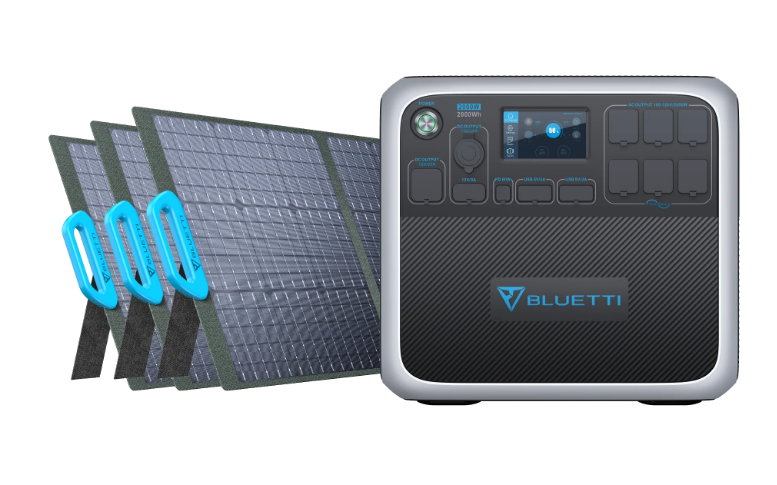Your cart is empty
Shop our productsIf you are immensely dependent on electricity, you should be prepared for any inconvenience. In situations like these, an emergency electricity source is the way to go. There are many emergency electrical sources that you can opt for according to your preferences.
In this blog, we will explore emergency sources that you can go with and supply electricity to your household appliances during power outages.
What is the Emergency Source of Electrical Power?
An emergency electrical source is your backup power source during unpredictable power disruptions. These disruptions may include weather interruptions, grid failures, natural calamities, and unexpected situations. No matter what the cause might be, power outages at crucial times can lead to professional and personal losses.
Typical power grids are prone to disruptions ranging from strong winds that can topple the electrical wires, leading to a city-wide blackout in a jiffy. However, these power outages can legit mean death in hospitals and no heat during winters. For some, power outages can be a harbinger of spoiled veggies and fruits in the fridge.
At times like these, the devices or systems you deploy to power appliances at your home are commonly termed emergency electricity sources. Typically, the private power supplies at home are portable power stations, generators, or battery-powered inverters. Furthermore, these can include a more complex emergency electricity source, such as a solar-powered home backup system.
Generally, these emergency electricity sources are deployed for individual needs. All these emergency electricity sources, like portable power stations and generators, are designed to supply an apartment or a household. On the other hand, the commercial and industrial areas are supplied through general power supplies, which are more sturdy.
What Are the Advantages of Emergency Electricity Source?

In an era of tech-driven life, every aspect of our lives is stagnant without an electricity supply. A power outage in today’s era has become far beyond a minor inconvenience. Electricity is immersed deep in our lives, and as an essential life chore, cooking is undone without electricity.
For instance, you need a refrigerator for perishable food items and security cameras for your own security, which are all run by electricity. Furthermore, if you are a corporate employee, your professional life relies on electricity, and a single outage can cause a delay in project submission.
As a result, it may tarnish your professional image and, in extreme situations, may heat your client enough to withdraw the project. In addition to this, many life-saving medical tools are dependent on electricity. For instance, dialysis machines or oxygen ventilators all need electricity to do their function. Hence, places like hospitals must always have a backup plan on the go-to source of these life-saving machines to combat severe risks.
To combat such situations, you need an emergency electricity source. You can survive in power crises only when you have a backup plan ready to take over. That way you will be able to dodge household crises at home, financial losses at the office, and health risks at hospitals.
Here are some of the advantages of emergency electricity sources:
- Reduced Business interruptions
- Reduced workplace injuries
- Reduced medical risks
- Low equipment damage
- Assured perishable food security
- It ensures home security when all the security cameras are electricity-driven.
What Are the Types of Emergency Electricity Sources?
The emergency electricity sources vary with their usage patterns and emergency advantages. Some of these emergency electricity sources are deployed as short-term emergency backup plans, while others are rechargeable batteries that can be used time and again.
Furthermore, there are portable power stations that you can use as an emergency electricity source. Also, there are gas generators that are used to supply your household appliances.
Sometimes, a power outage may last between some hours to a few days. Furthermore, some areas may face less frequent power outages. For areas like these, you will require short-term emergency electricity sources. Although such rare outages might not be as hazardous, you still need to be prepared for such emergency situations.
There are multiple emergency electricity sources available that you can deploy to supply your household appliances for temporary outages. For instance, you can use rechargeable batteries, portable power stations, and gas generators.
1. Rechargeable Batteries
Rechargeable batteries have been a popular choice as emergency electricity sources for domestic use. You can recharge and reuse the batteries as long as you want. Furthermore, the battery is easy to use and is one of the most reliable emergency electricity sources. These can last longer than you expect with their durability and reliability.
You can supply devices like flashlights, phones, and radios through these rechargeable batteries. These rechargeable batteries are cost-effective in the long run. Furthermore, these batteries are comparatively more eco-friendly.
2. Portable Power Banks
Portable power banks are the most useful emergency electricity source that you can carry along when traveling in remote areas. These portable power banks can charge multiple devices on the go.
You can use these portable power stations to charge devices like cell phones, small electronics, and tablets. Some power banks are so compact that you can carry them in your pockets or handbags.
While traveling, you should at least have a single power bank in your luggage to ensure constant power. On the other hand, these portable power banks might not be able to supply your home appliances, but you can recharge your personal electronics. Furthermore, these power banks need to be recharged through grid power.
3. Gas Generators
Gas generators are quite popular among certain communities. Many commercial enterprises and households prefer to go with gas generators as their emergency electricity source. Gas generators are popular for their reliability in situations like cyclone-induced power outages and for their easy operation.
If you are in an area where power outages are frequent and a part of your lifestyle, you definitely need a gas generator as your emergency electricity source. These generators can supply heavy household appliances like bilge pumps, refrigerators, and furnace fans.
However, you may need petroleum in addition to the gas for the normal functioning of gas generators. It might be the case that you lose natural gas connection at times like natural calamities, i.e., earthquakes. Hence you should have some petrol stored in your house for emergency conditions where both electricity and gas connections are disrupted.
4. Solar Generators

If you are concerned about the environment, you can go with a greener emergency electricity source. Solar generators are one of the most eco-friendly sources of electricity in emergency conditions. You can also install a solar-powered generator at your home as a permanent backup to supply your household needs.
These solar generators are portable and can be plugged in and utilized whenever needed. You can use solar panels to generate and store electricity for your household use by capturing the sunlight.
3 Best Solar Generators for Emergency Power
If you install a solar generator for your permanent needs, such generators can supply your household appliances, heating and conditioning systems, and other electronic devices.
1. BLUETTI AC200MAX + 2*B230 + 3*PV200
If you are looking for a solar generator that is reliable and sturdy, you can go with BLUETTI AC200MAX + 2*B230 + 3*PV200.

This generator kit can supply 2,200 watts of pure sine wave AC. Furthermore, it can supply a temporary surge of power extending up to 4,800W. This solar generator kit also comes with a battery that can store as much as 6144 watt-hours of capacity.
Furthermore, this BLUETTI kit also includes two B230 batteries that are LiFePO4 batteries. These batteries can last even after you have recharged and discharged them more than 3,500 times. It will still retain 80% of its efficiency.
This kit also includes three PV200 Solar Panels, which are monocrystalline and 23.4% efficient. These are foldable and portable solar panels that are compatible with solar generators.
2. BLUETTI AC200P + 3*PV120

BLUETTI AC200P + 3*PV120 is also another solar-powered generator that can supply a continuous flow of 2,000 watts of power and a transient surge of 4,800 watts. The battery in the kit can store power up to 2,000Wh. It comes with 17 output ports to charge or supply multiple devices simultaneously. Additionally, you can recharge these generators through seven options, including the AC, Solar, car, generator, and lead battery.
Find out more about; Is the BLUETTI AC200P Portable Power Station worth it?
This kit also includes three PV120 solar panels, which are monocrystalline and 23.4% efficient. You can fold and carry these solar panels wherever you go.
3. BLUETTI AC300 + 4*B300

You can also go with BLUETTI AC300 + 4*B300 as your home backup option. With this solar generator kid, you can produce 3,000 watts of pure AC sine wave and a transient surge of 6,000 watts to start your heavy appliances.
The AC300 power station can store 3,072 watt-hours of energy, and with four B300 batteries, the storage capacity expands up to 12,288 watt-hours, which is the total capacity of this power generator kit. You can use it as a 24/7 backup system for your home. Furthermore, it offers a diversity of options to recharge the portable power station.
These four B300 are LiFePO4 batteries, which implies that you can recharge and discharge the battery more than 3,500 times, and it will still work at 80% efficiency.
You can recharge the portable power station through seven options: AC source, solar panel, car outlet, generator, lead-acid battery, and dual AC source. It needs 2,400 watts of solar input to recharge the power station.
Final Words
In an era densely dependent on electricity-powered technology, you cannot risk your professional or personal life without an emergency backup.
You can back up your household electronics at times of emergency, like blackouts or power outages, using devices like rechargeable batteries, gas generators, and solar generators.
Solar generators are on the lead in popularity as an emergency backup supply for households. You can choose between a variety of options available online.
Shop products from this article
You May Also Like

What Does a 30% Federal Solar Tax Credit Mean and How to Apply?
Governments around the world are offering programs that encourage homeowners to switch to solar energy. Among the most notable programs is the 30% Federal Solar Tax Credit. It reduces your...

Deadly Flooding Devastates U.S. South and Midwest — What You Need to Know































































































































































































































































